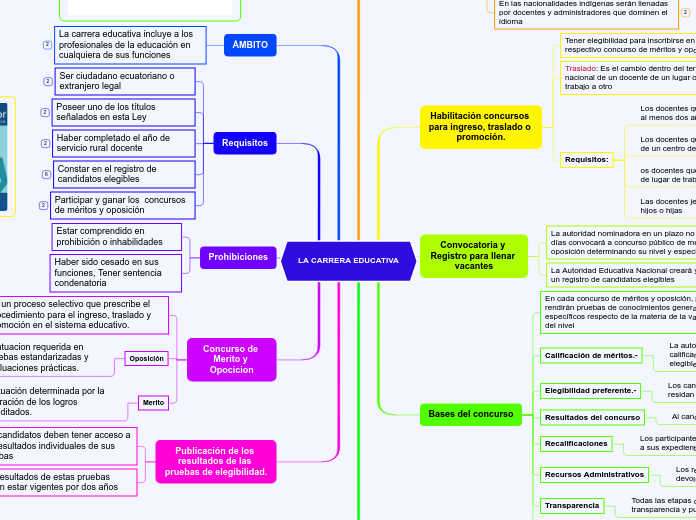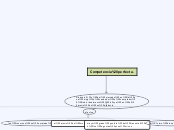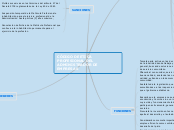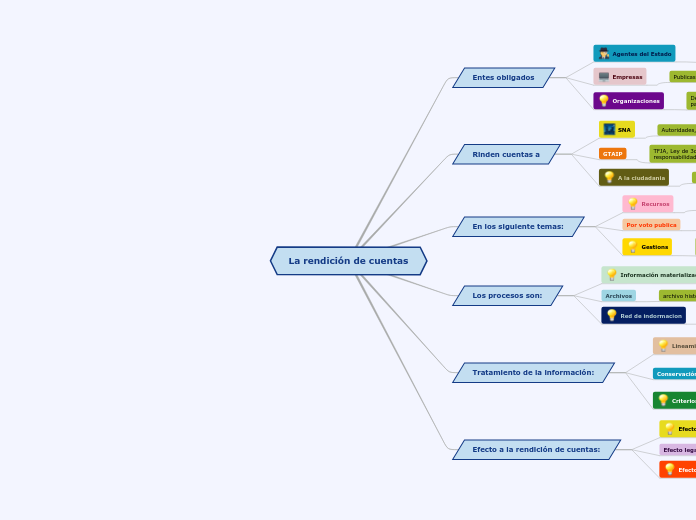Floating topic
LA CARRERA EDUCATIVA
The part of speech is a category to which a word is assigned according to its syntactic functions. In English the main parts of speech are noun, pronoun, adjective, determiner, verb, adverb, preposition, conjunction, and interjection.
Publicación de los resultados de las pruebas de elegibilidad.
A conjunction is a word like 'if' 'but' or 'and' which is used to connect sentences or clauses together.
Los resultados de estas pruebas deben estar vigentes por dos años
Subordinating conjunctions are conjunctions that are used at the beginning of subordinate clauses. Some examples of these conjunctions are: although, after, before, because, how, if, once, since, so that, until, unless, when etc.
Although it was raining, I went out.
Los candidatos deben tener acceso a los resultados individuales de sus pruebas
Coordinating conjunctions always connect phrases, words, and clauses. They are: for, and, nor, but, or, yet, so.
This stew is savory and delicious.
Concurso de Merito y Opocicion
A preposition is one of the most exciting parts of grammar. A preposition is used to describe the location of something in relation to something else.
Merito
puntuación determinada por la valoración de los logros acreditados.
Oposición
Participle preposition consists of words that end in “ing”.
Puntuacion requerida en pruebas estandarizadas y evaluaciones prácticas.
Es un proceso selectivo que prescribe el procedimiento para el ingreso, traslado y promoción en el sistema educativo.
When a preposition consists of one word it is called single or simple preposition.
in, at, on, to for, of, from, up, after, over, under, with, etc.
Prohibiciones
An interjection is used to express emotion in a sentence.
Think of other interjections!
Haber sido cesado en sus funciones, Tener sentencia condenatoria
Estar comprendido en prohibición o inhabilidades
Requisitos
An adverb is used to describe a verb, but it can also describe an adjective or another adverb.
Adverbs normally help paint a fuller picture by describing how something happens.
Participar y ganar los concursos de méritos y oposición
A lot, Little, Much
Constar en el registro de candidatos elegibles
The intensifiers strengthen adverbs adjectives and adverbs and down- toners make them weaker.
down-toners
Fairly, Rather
intensifiers
Extremely, Very
Haber completado el año de servicio rural docente
Just, Afterward, Soon, Currently
Poseer uno de los títulos señalados en esta Ley
Always, usually, Never
Ser ciudadano ecuatoriano o extranjero legal
Carefully, Slowly
ÁMBITO
A numeral is a word or phrase that describes a numerical quantity.
Some theories of grammar use the word 'numeral' to refer to cardinal numbers that act as a determiner to specify the quantity of a noun, for example the 'two' in 'two hats'.
La carrera educativa incluye a los profesionales de la educación en cualquiera de sus funciones
First, second..
Escala ascendente de calificación de los títulos
An article is a word used to modify a noun, which is a person, place, object, or idea. Technically, an article is an adjective, which is any word that modifies a noun.
Grado académico de PhD
100%
Títulos de cuarto nivel
90%
Títulos de tercer nivel
70%
Técnicos o Tecnológicos superiores
Indefinite articles are the words 'a' and 'an.' Each of these articles is used to refer to a noun, but the noun being referred to is not a specific person, place, object, or idea. It can be any noun from a group of nouns.
50%
Profesores Normalistas
It refers directly to a specific noun or groups of nouns.
20%
Bases del concurso
A pronoun is a word that can be used in place of a noun, typically after the noun itself has already been stated.
Indefinite
Unlike demonstrative pronouns, which point out specific items, indefinite pronouns are used for non-specific things. This is the largest group of pronouns. All, some, any, several, anyone, nobody, each, both, few, either, none, one, and no one are the most common.
None, Several
Transparencia
Relative pronouns are used to add more information to a sentence. Which, that, who (including whom and whose), and where are all relative pronouns.
Todas las etapas del concurso deberán tener transparencia y publicidad
Recursos Administrativos
Interrogative pronouns are used in questions. Although they are classified as pronouns, it is not easy to see how they replace nouns. Who, which, what, where, and how are all interrogative pronouns.
Los recursos se interpondrán en el efecto devolutivo.
Recalificaciones
Reciprocal pronouns are used for actions or feelings that are reciprocated. The reciprocal pronouns are each other and one another.
Los participantes podrán solicitar la recalificación a sus expedientes
Resultados del concurso
A reflexive pronoun ends with ...self or ...selves and refers to another noun or pronoun in the sentence (usually the subject of the sentence). The reflexive pronouns are myself, yourself, herself, himself, itself, ourselves, yourselves, and themselves.
Al candidato que obtenga la mejor calificación
Elegibilidad preferente.-
Demonstrative pronouns are used to demonstrate (or indicate). This, that, these, and those are all demonstrative pronouns.
Los candidatos que tengan su domicilio y residan en el lugar donde esta la vacante
Calificación de méritos.-
Possessive pronouns are used to show possession. The possessive pronouns are mine, yours, his, hers, ours, and theirs.
La autoridad se encargará de calificar los méritos de candidatos elegibles
En cada concurso de méritos y oposición, los candidatos rendirán pruebas de conocimientos generales y específicos respecto de la materia de la vacante a llenar y del nivel
The personal pronouns are I, you, he, she, it, we, they. More often than not (but certainly not always), they replace nouns representing people.
He, They
Convocatoria y Registro para llenar vacantes
An adjective is a word that's used to describe a specific noun and to provide more detail to the listener.
La Autoridad Educativa Nacional creará y organizará un registro de candidatos elegibles
Superlative adjectives demonstrate a higher level of comparison between entities.
She is the prettiest princess.
La autoridad nominadora en un plazo no mayor de 30 días convocará a concurso público de méritos y oposición determinando su nivel y especialidad.
Expresses a comparison between two entities or groups of entities in quality or degree.
He is taller than she is.
Habilitación concursos para ingreso, traslado o promoción.
A noun is defined as a person, place, thing or idea. Proper nouns always begin with a capital letter. Common nouns, which are general words, such as 'cars,' are not capitalized.
Requisitos:
A noun which refers to a group of things/people.
Las docentes jefas de familia con hijos o hijas
os docentes que requieran cambiar de lugar de trabajo por amenaza
Los docentes que deban vivir cerca de un centro de salud por necesidad
Los docentes que hayan laborado al menos dos años lectivos
Traslado: Es el cambio dentro del territorio nacional de un docente de un lugar o puesto de trabajo a otro
Countable nouns are nouns that can be counted, even if the number might be extraordinarily high.
Uncountable nouns are nouns that come in a state or quantity which is impossible to count; liquids are uncountable, as are things which act
like liquids.
Cats, Rain
Tener elegibilidad para inscribirse en el respectivo concurso de méritos y oposición.
Proper nouns are the names of specific people or places. They should always begin with a capital letter.
Mary, Paris
Vacantes
A verb is an action word or 'doing' word that signifies movement in some way.
En las nacionalidades indígenas serán llenadas por docentes y administradores que dominen el idioma
A participle is a verb form that can be used as an adjective or to create a verb tense. There are two types of participles: Present participle (ending -ing) and Past participle (usually ending -ed, -d, -t, -en, or -n).
The winning athlete gets a trophy.
En Educación Intercultural Bilingüe las vacantes serán llenadas por docentes que hablen el idioma
A modal is a type of auxiliary (helping) verb that is used to express: ability, possibility, permission or obligation. The main modal verbs in the English language are: can, could, may, might, must, shall, should, will, would.
Las vacantes se llenan mediante concursos de méritos y oposición en los que participan aspirantes para ingresar a la carrera educativa pública
A linking verb connects the subject with a word that gives information about the subject, such as a condition or relationship.
You look exhausted after studying all night.
Las vacantes se producen cuando un docente cesa en sus funciones por renuncia, destitución, jubilación o fallecimiento
A verb with its own meaning: a verb that is not an auxiliary verb.
Create sentences
They have it.









